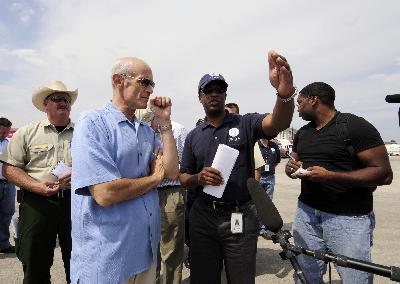Ike Response

I’ve spent the past two days in Texas meeting with state and local leaders and visiting evacuees and distribution centers in Houston and surrounding areas. From what I’ve seen during my two visits, there’s no question that Ike was an extremely strong storm that has left much of Galveston temporarily uninhabitable and affected millions of residents along the Texas coast.
While I can understand people’s desire to return to their homes, this environment provides a stark reminder that it’s often the after-effects of a hurricane that pose the greatest danger to health and safety. With limited electrical power, healthcare, and basic services, it’s imperative that evacuees remain patient until officials get things such as water, sewage, and electricity up and running.
Despite the widespread destruction, however, I can tell you that emergency managers and relief workers – including FEMA employees, faith-based organizations, and hundreds of volunteers – are working feverishly to provide supplies as quickly as possible to those in need. The resilience of Texas residents affected by this storm was evident in a Houston shelter I visited yesterday, where I met with several evacuees while their children played with one another in a local church (which had also been used to house Katrina and Rita evacuees three years ago).
As we work collaboratively to get these services up and running, it’s important to keep in mind an old saying, “they don’t call it a disaster for nothing.” In other words, emergency management is never an exact science and responders at every level must be prepared to adapt to unforeseen challenges. For example, earlier this week electrical workers from Ohio and other Midwestern states who were restoring power in Texas were called back to their home states following widespread power outages caused by Ike’s remnants. This reinforces the need to remain flexible, nimble, and adapt to changing circumstances.
Michael Chertoff
While I can understand people’s desire to return to their homes, this environment provides a stark reminder that it’s often the after-effects of a hurricane that pose the greatest danger to health and safety. With limited electrical power, healthcare, and basic services, it’s imperative that evacuees remain patient until officials get things such as water, sewage, and electricity up and running.
Despite the widespread destruction, however, I can tell you that emergency managers and relief workers – including FEMA employees, faith-based organizations, and hundreds of volunteers – are working feverishly to provide supplies as quickly as possible to those in need. The resilience of Texas residents affected by this storm was evident in a Houston shelter I visited yesterday, where I met with several evacuees while their children played with one another in a local church (which had also been used to house Katrina and Rita evacuees three years ago).
As we work collaboratively to get these services up and running, it’s important to keep in mind an old saying, “they don’t call it a disaster for nothing.” In other words, emergency management is never an exact science and responders at every level must be prepared to adapt to unforeseen challenges. For example, earlier this week electrical workers from Ohio and other Midwestern states who were restoring power in Texas were called back to their home states following widespread power outages caused by Ike’s remnants. This reinforces the need to remain flexible, nimble, and adapt to changing circumstances.
Michael Chertoff
Labels: FEMA, natural disasters, preparedness


1 Comments:
couldn't agree more! and we are remaining strong through all of this. it is an emotional rollercoaster, and especially when an area like Houston is hit, because it is compounded... exponentially. thanks and God bless!
By whimsicalrandomness, At
September 19, 2008 5:54 PM
whimsicalrandomness, At
September 19, 2008 5:54 PM
Post a Comment
Create a Link
<< Home